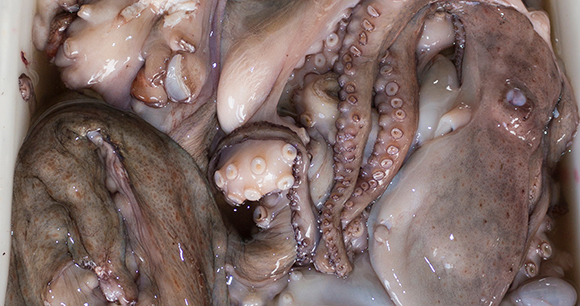Octopus Farming’s Odious Outlook
The unsustainability and cruelty involved in octopus farming prompted Sens. Sheldon Whitehouse (D-RI) and Lisa Murkowski (R-AK) to introduce the Opposing the Cultivation and Trade of Octopus Produced through Unethical Strategies (OCTOPUS) Act (S 4810) this summer. This bill would prohibit both commercial octopus farming in the United States and any import of farmed octopus. In October, California became the second state, after Washington, to ban octopus farming and farmed octopus imports. A similar bill has been introduced in the Hawai‘i legislature.

Octopus is consumed in many places, primarily as a delicacy rather than a staple food. Overfishing has led to declining wild octopus populations, which has prompted some companies to develop a model for commercial farming to meet demand. So far, none have been successful.
With large brains and sophisticated nervous systems, octopuses have demonstrated an uncanny ability to solve complex problems, distinguish between individual humans, and outwit predators, as well as engage in playful behavior. They also tend to be nonsocial and have high enrichment needs—such that the barren individual housing necessary for profitable production would severely compromise their welfare and result in significant suffering. In fact, efforts to farm octopuses have been plagued by high mortality rates, increased aggression, and parasitic infection. In addition, octopuses are carnivorous and typically consume three times their weight in food, meaning that production on any scale would further overburden fisheries.
Program Terms: Farmed Animals, Marine Wildlife
AWI Quarterly Terms: Government/Legal, Quick Read
Related News
Titus Reintroduces Humane Transport of Farmed Animals Act as New AWI Report Reveals Feeble Enforcement of Welfare Violations
In Program: Farmed AnimalsToday, US Rep. Dina Titus (D-NV) reintroduced the Humane Transport of Farmed Animals Act to improve conditions for livestock transported across the United States. The bill would...
North American Environmental Commission Confirms Mexico’s Role in Imperiling Vaquita
In Program: Marine WildlifeA commission under the United States-Mexico-Canada Trade Agreement (USMCA) released a report yesterday confirming that Mexico’s unwillingness to enforce its own wildlife protection, trade, and fisheries laws...
Captive dolphins face uncertain futures. They deserve better
In Program: Marine WildlifeIn this op-ed for the Tampa Bay Times, Dr. Naomi Rose, AWI’s senior scientist in marine mammal biology, discusses the challenges in caring for orcas...
Yahoo! Japan Sells Polluted Whale and Dolphin Meat Products to Unsuspecting Consumers
In Program: Marine WildlifeThe Animal Welfare Institute (AWI) and an international coalition of animal protection and environmental groups are calling on Yahoo! Japan and its parent company, the...